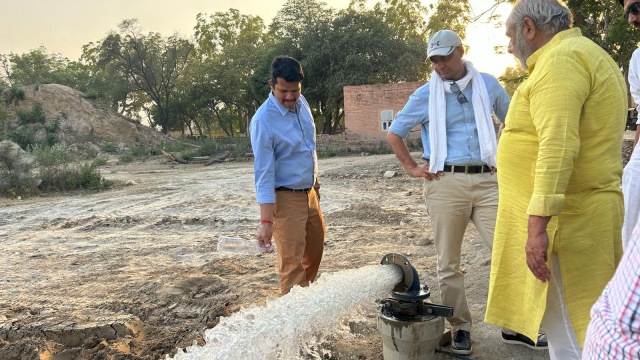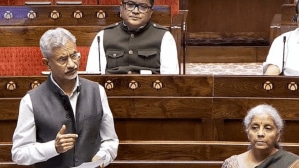Contaminated water in Punjab’s Malwa canals; Abohar residents getting drinking water on alternate days
In Abohar under Fazilka district, the municipal corporation has set up five new tube wells near the canal area to ensure the supply of potable water.
 MLA Sandeep Jakhar supervises a bore work in Abohar. (Express photo)
MLA Sandeep Jakhar supervises a bore work in Abohar. (Express photo)
More than a month after the issue was first flagged, contaminated water continued to flow through canals in the Malwa districts of Punjab – Fazilka, Faridkot, and Muktsar – on Monday.
In Abohar under Fazilka district, the municipal corporation has set up five new tube wells near the canal area to ensure the supply of potable water. Drinking water is being provided to residents on alternate days. In Muktsar, too, residents are facing severe water scarcity, with most relying on private borewells in homes or common areas to fetch water for domestic use.
Speaking to The Indian Express, Abohar MLA Sandeep Jakhar said, “The state of affairs is dismal. We in Abohar had to bore five additional tube wells because the canal water has not been potable for the past month. Such high contamination levels for such a long period have never occurred before. The government is fast asleep. Since our Abohar and Balluana areas are completely dependent on canal water for drinking and farming, alarm bells should have been ringing in the irrigation department, but alas…”
“Even in many parts of Muktsar, contaminated water is being supplied through taps by the Water Works Department… along with the canals. The department stores canal water and then supplies it for drinking purposes,” said Kanwarjit Rozy Bakrandi, former Shiromani Akali Dal (SAD) MLA from Muktsar constituency.
He added, “The Sirhind Feeder flowing through our area gets its supply from Harike Headworks, which is sending discoloured water. The same situation is being observed with the Abohar branch that supplies water to various distributaries in Fazilka and Muktsar districts.”
Meanwhile, Jakhar said, “Water tankers cannot meet Abohar’s drinking water needs, as our area relies entirely on canal water. Hence, new tube wells were dug near the canals to extract relatively safe groundwater. We suggested this to the Municipal Corporation, Abohar, which promptly acted. However, it is surprising that the irrigation department has not taken any steps to improve the situation, despite repeated appeals from farmers and residents.”
Some farmers argued that the crisis may have been exacerbated by the Water (Prevention and Control of Pollution) Amendment Act, 2025, passed by the Punjab Vidhan Sabha in February 2025. Earlier, violations under water pollution laws could lead to imprisonment for up to six years. After the amendment, imprisonment provisions were removed for most offenses, with violators now facing monetary fines ranging from Rs 10,000 to Rs 15 lakh.
While the Punjab Government claimed the amendment was intended to simplify legal compliance and facilitate ease of doing business, environmentalists and Opposition leaders have argued that it has weakened enforcement against water pollution. They fear industries may simply “pay and continue”, causing harm to Punjab’s rivers and groundwater.
Farmers have alleged that, with the Ludhiana West Assembly bypolls approaching, authorities have become lenient towards industries discharging untreated waste into the Buddha Nullah, which eventually merges with the Sutlej River. The contaminated river water is then carried downstream to Harike Headworks, affecting the quality of canal water in the Malwa districts.












